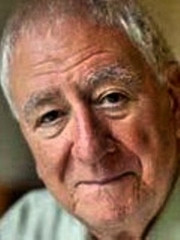|
Back
Rands, from Chaconne to Chowder New York
Miller Theater, Columbia University
11/13/2014 -
Composer Portraits
Bernard Rands: Folk Songs (New York premiere) – Memo 6 – Concertino – déjà
Anthony Roth Costanzo (Counter-tenor), Ryan Muncy (Alto Saxophone), Nicholas Masterson (Oboe)
International Contemporary Ensemble, Christian Knapp (Conductor)
Claire Chase (Interlocutor)

B. Rands (© Courtesy of the Artist)
“I revere two things,” said composer Bernard Rands in this 80th Birthday Celebration last night. “I revere instruments, and I revere the people who play these instruments.”
That was certainly obvious in the four pieces played last night. Outside of brilliance, inspiration, and an almost unnerving homage to his teacher and friend, Luciano Berio, they had little similarity. In déjà, we had a work with its aleatory moments, where each member of the ensemble could signal in other members, who would have choices to play. In Media 6, the solo saxophone player could have been playing one of Berio’s Sequenzas, a solo virtuosity.
Concertino explored the sheer virtuosity of an oboist, against the shimmering colors of harp, string and winds. And finally, with Folk Songs, we had an almost literal homage to Berio, who wrote his own Folk Songs with a half-dozen different languages.
And now a confession, that though Mr. Rands is honored internationally, and has been a celebrated figure throughout the United States, I had (gulp) never heard of the composer before hearing of this concert. Twas a sin of omission. But after listening to Concertino on YouTube, I felt it necessary to make his musical acquaintance at the Miller Theater “Composer Portraits”.
In one way, this was difficult, for the paper listing the music not only omitted the list of ensemble musicians, it didn’t have a word of explanation.
Some music needs, if not a detailed map, at least a few landmarks to point the way. Even the scholars and musicians who made up the bulk of the audience were heard complaining. So this Rands-neophyte was lost, at least in the solo Media6, which was like free jazz without a rhythm.
To the fine soloist, Ryan Muncy, I plead nole contendre and mea culpa.
In the post-intermission conversation with the sprightly composer, flutist Claire Chase showed us that déjà was inspired by the grammar of Samuel Beckett, and an original form of logic. Little was said about the other works, but Folk Songs, which hardly needed introductions was delved into as an “autobiographical” list of songs to places where Mr. Rands had lived.
Still, if little cerebral understanding, much primary enjoyment, to be sure.
déjà had the benefit of a beautiful piano repeated theme, a chaconne or organum, taken apart by the strings and percussion player, then varied, and mixed together with (as I learned later) a mixture of compositions which would be original each time it was played.
Concertino featured oboist Nicholas Masterson, who not only started with an improvisatory solo, but played virtually throughout the 15 minutes. The structure was a tabula blanca to this listener, but the organization of sounds was actually thrilling. The combination of harp (not glissando harp, but twanging note by note harp) with oboe with strings and winds and tiny cymbals in the percussion was dazzling on its own, as was Mr. Masterson.

A. T. Costanzo (© setcelebs.com)
The final half was devoted first to the discussion by Ms Chase and Mr. Rands, and then to the simplest and most fascinating work, Folk Songs. The languages were Welsh, English, Scots, Spanish, Italian and one or two I didn’t recognize. (Just as Berio in his Folk Songs has a song in “Azerbaijani” which he took down by rote. Actually Azerbaijani is simply a form of Turkish.)
The soloist was the famed, personable, delightful and absolutely spot-on counter-tenor Anthony Roth Costanzo, who had been wildly praised after appearing as Fledermaus’ “Count Orlovsky” at the Met.
These songs were exactly like the Berio: continuous, with musical interludes, with ensemble harmonies that reflected the moods, with dissonances only when necessary, with work that showed an honest appreciation for every nuance.
Mr. Costanzo took advantage of each syllable, his voice as precise as the ensemble (which chimed in at the end of the Scots song “Without a Hat”.) Were this group to record Rands’ Folk Songs, it will be in a place of honor along with my Berio Folk Songs.
In the meantime, the opening Irish folk song, “Missus Murphy’s Chowder”, is one of the funniest pieces I’ve heard in years. The whole thing is hilarious, but let me end this quite inadequate review with a most adequate verse:
The plumber died the other day; /They embalmed him right away/In a bowl of Mrs. Murphy’s Chowder.”
And amen to all that.
Harry Rolnick
|